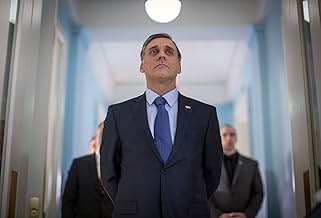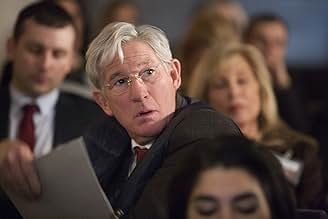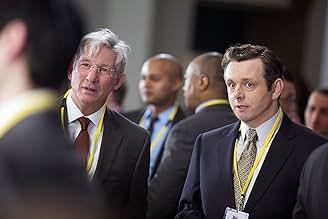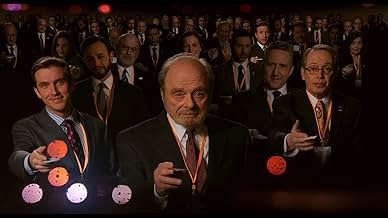L'incredibile vita di Norman
Norman Oppenheimer è un piccolo operatore che stringe amicizia con un giovane politico che sta attraversando un momento difficile della sua vita. Tre anni dopo, quando il politico diventa un... Leggi tuttoNorman Oppenheimer è un piccolo operatore che stringe amicizia con un giovane politico che sta attraversando un momento difficile della sua vita. Tre anni dopo, quando il politico diventa un influente leader mondiale, la vita di Norman cambia drasticamente in meglio e in peggio.Norman Oppenheimer è un piccolo operatore che stringe amicizia con un giovane politico che sta attraversando un momento difficile della sua vita. Tre anni dopo, quando il politico diventa un influente leader mondiale, la vita di Norman cambia drasticamente in meglio e in peggio.
- Regia
- Sceneggiatura
- Star
- Premi
- 1 vittoria e 1 candidatura in totale
- Ron Maor
- (as Dov Glickman)
- Jacques
- (as Isaach De Bankole)
Recensioni in evidenza
The 'fixer dynamic' drives the film's titular character, Norman Oppenheimer (Richard Gere). He is a lonely middle age Jew without visible means of support except for being a life-size parasite on other people. The archetype of a pathological liar and dreamer, his modus-operandi could be labelled corrupt in an ethics debate: he flatters, panders, and gives gifts to those richer or more powerful, always manouvering for return on investment. By chance, he latches onto low-ranking Jewish politician Micha Eshel (Lior Ashkenazi) and gifts him a pair of outrageously expiensive shoes. They lose contact, but Norman has bought the right to drop his name anywhere. Three years later, Eshel is elected Prime Minister of Israel and Norman attends the celebrations. They re- unite and Eshel repays Norman by inviting him into the tent of influence where he is quickly out of his depth. As an inveterate fixer, he builds a complex web of promises that mostly cannot be delivered. While he does some good for some people, his house of cards eventually collapses and we are invited to judge where moral culpability lies. For every successful Eshel there are scores of Normans.
Richard Gere's superbly enigmatic characterisation of Norman is the heart of this dialogue-driven film. He is irritatingly unlikeable, like a fly on a hot summer day, yet somehow endearing. He is arrogant yet vulnerable; desperate for acceptance yet with few admirable attributes. His story is whimsically satirical rather than funny and at times it wobbles precariously on the inter-personal dynamic between two unpleasant stereotypes, Norman and Eshel. Some filming gimmickry, like split screens and freeze action scenes, is unhelpfully distracting and two hours is a long time for a character study. But with clear echoes of Woody Allen-esque existentialism, this film outs the fixer caricature that feeds voraciously in circles of influence. In professional domains they are called lobbyists.
"Norman" was called "Oppenheimer Strategies", which is a way more interesting name. "Norman" sounds bland and generic, and I wish they have stuck with the original name which is more mysterious and thrilling. Anyway, the plot is actually engaging and mysterious at the same time. At first, I find Norman a compulsive liar, but then I begin to think he might be genuinely helpful and kind. The ultimate culmination is unexpected, and makes me really think about Norman's actions and motivation behind the action.
When initially asked if I would recommend this film I responded, "Ah, recommend? ... I don't think so." In retrospect, I think that it can be appreciated, provided that one understands the viewpoint of its Israeli writer/director.
I'll digress briefly to address the elephant in the room: Richard Gere. I was initially offended that he was allowed to (and that he had the gall to) play a Jew, but he was actually very good in the role. Without chewing the scenery, he showed that he's a talented actor who can "just go into character," and for him "less is more."
Now, there are two main points I think every viewer needs to know: First, it's a very Israeli movie (and that's what it is); you either know what that means or you simply do not. And, secondly, Israelis are looking for "the message" or "the lesson" of the film, which isn't clear, and most complain that "it has no plot." Non-Israelis, on the other hand, are left asking themselves if there are gaping holes in the film that are just not filled in, and thus find it "very confusing" or "totally unrealistic." I, however, understand what the director is going for. He's seeing Israeli politics through the eyes of 90% of Israelis (who all want pretty much the same thing: "to part with the Arabs"). Through that lens, he presents the image of an ideal Israeli political candidate who's actually capable of making a difference (i.e. "peace"), and when the wheels start moving to oust him, as they do in Israel with any successful politician, our attention is focused on the internal conflict of his "Diaspora Jewish businessman" vis-à-vis whether he can be altruistic enough, or just desperate enough, to realize the greater picture and appreciate the sincere relationship he has with this great scion, and perhaps to be ready to give up the short-lived glory he can finally reap from these events and even to fall on his own sword for the sake of the greater good.
Once I realised what it was, I sat back with no vested interest in the outcome and just enjoyed it like a foibled fairytale (or a story submitted by a child) portrayed onscreen by an A-list cast.
Without actively recommending it, I'm just telling the public what it is. A fourth-to-sixth grader's story (including that child's perception of reality and wishful thinking) presented by an A-list cast ... in which, if any of it were to happen then this is actually how it would play out. When you accept that this is the case, that you're missing nothing and that this is how Middle East politics actually plays out on the ground (that's right, you're not missing anything, this really is the circus of politics in Israel as it's portrayed in this film), then maybe you can sit back and allow yourself to enjoy it too.
Casting gentiles in most of the major Jewish roles in this film should not be controversial, as certainly all recent Mafia epics have cast Brits, Irish and Australian actors in the Italian parts for the obvious reason that Italian actors, even De Niro, are tired of the ethnic gangster stereotype unless it's a comedy or spoof. Gere creates a memorable and unique character that avoids the obvious clichés.
Just as in "Pretty Woman" he so ably played second-fiddle to his co-star Julia Roberts (in the role that made her a star) here Gere is actually overshadowed in the charisma department by his amazing Israeli co-star Lior Ashkenazi as Eshel, a minor Israeli politician befriended (for purely self-serving reasons) by Gere as Norman Oppenheinmer, Eshel later becoming his country's powerful prime minister.
Norman is a finagler (I couldn't place the proper Yiddish word to describe him), with a compulsion to inveigle his way into people's good graces usually in the manner of a "cold call" handled in person, in order to make them beholden to him for future payoff. It's analogous to the premise behind Puzo's "The Godfather", in which Don Corleone does favors that ultimately will be paid back when the time is propitious, and is best described in the film's wonderful hand-drawn charts which Kevin Bacon-like link people together in complicated diagrams. Besides its obvious content, the film works on a different level to show the negative side of our era's current craze for "networking", a practice that has been enshrined as the cure-all for unemployment (or underemployment) at a certain level of society but which in this case involves extreme, insidious manipulation.
Starting with buying the visiting Eshel an expensive pair of shoes as the Israeli visits New York City on government business (Isaach De Bankole as the shoe salesman is the first of numerous terrific small- role performances by instantly recognizable actors who usually have leading parts in movies), Norman compulsively fabricates far-fetched stories of his linkage to everybody while creating tenuous links in order to concoct complicated schemes, which he calls "Strategies" on his business card.
He's a mysterious figure, always clad in his camel's hair overcoat and seemingly homeless as we never see him except in public places, usually on the phone via earphones pestering folks. On the surface he is a bore -the type one meets at a cocktail party or in the next seat on a plane and makes one wish to escape from his barrage of intrusive blather.
But writer-director Cedar not only humanizes Norman but by the end of the film makes us see the good that results from his weird projects, even though Norman himself faces a tragic fate. A stumbling block for me to get into the picture was Cedar's rather forced and overly fanciful use of tropes from the school of "Magical Realism", often showing the characters, even as far away as one in NYC and the other in Israel, staged on the same set as if together, ultimately making much of the film seem like merely a fever dream hallucination in Norman's brain rather than actually occurring events.
That "is it real?" aspect is already in the script by way of the constant prevarication and self-delusional assertions Norman makes, always exaggerating his own importance. He's not a liar per se, but as Kellyanne Conway has so vividly put it, a believer in alternate facts. When called on it, he tries to weasel his way out of a corner, but much of the film's effective black humor stems from the fact that the audience is privy to both sides of the story.
Fate is a crutch that Cedar uses to keep the pot boiling but makes most of the movie's twists and turns too far-fetched to be believable. I would have much preferred an organic, unpredictable story line rather than the too-tight, very contrived approach, but that is the auteur's prerogative. These characters, especially Norman, have no degrees of freedom, while good (if conventional) writing is based on giving protagonists enough degrees of freedom to make choices and thereby create viable drama based on the consequences of their specific choices.
In addition to Gere's thoughtful and always in character bravura performance and Ashkenazi's empathetic brilliance (he was great in an earlier Israeli film called "Footnote" that deserves to be more widely known), the spot roles so beautifully enacted include Charlotte Gainsbourg popping up and underplaying in chilling fashion as an Israeli prosecutor/investigator crucial to the story's payoff; Steve Buscemi cast against type as a duped Rabbi, who later shows the explosiveness fans have come to expect from the "Boardwalk Empire" star; Michael Sheeen, perfect as Norman's hapless and put-upon nephew; Harris Yulin as a tough NY power broker; and especially Hank Azaria, briefly astounding as Norman's unlikely doppelganger. This type of self-effacing ensemble is what the Screen Actor's Guild created its best "Cast in a Motion Picture" award to honor.
Lo sapevi?
- QuizHalf of the film was shot in New York City and half of it in Jerusalem, Israel. The original poster for the movie showed the two main actors, Richard Gere and Lior Ashkenazi, standing back to back, with Gere in New York City and Ashkenazi in Jerusalem.
- Citazioni
Norman Oppenheimer: There are two kinds of moguls: First kind is like a big ocean liner ship. Makes a lot of waves, a lot of noise, everybody sees it coming from miles away. Like Jo Wilf. I think your boss, Minister Maor, is actually... in his close circle of friends. of course. And then there is Arthur. Well, Arthur is more like a nuclear submarine. he's quiet, he's fast, he's young. Extremely sophisticated.
- ConnessioniReferences Exodus (1960)
- Colonne sonoreMi Sheberach
Traditional
Arranged by Raymond Goldstein
I più visti
- How long is Norman?Powered by Alexa
Dettagli
- Data di uscita
- Paesi di origine
- Siti ufficiali
- Lingue
- Celebre anche come
- Norman
- Luoghi delle riprese
- Aziende produttrici
- Vedi altri crediti dell’azienda su IMDbPro
Botteghino
- Lordo Stati Uniti e Canada
- 3.814.868 USD
- Fine settimana di apertura Stati Uniti e Canada
- 99.211 USD
- 16 apr 2017
- Lordo in tutto il mondo
- 6.217.567 USD
- Tempo di esecuzione1 ora 58 minuti
- Colore
- Proporzioni
- 1.85 : 1
Contribuisci a questa pagina











































